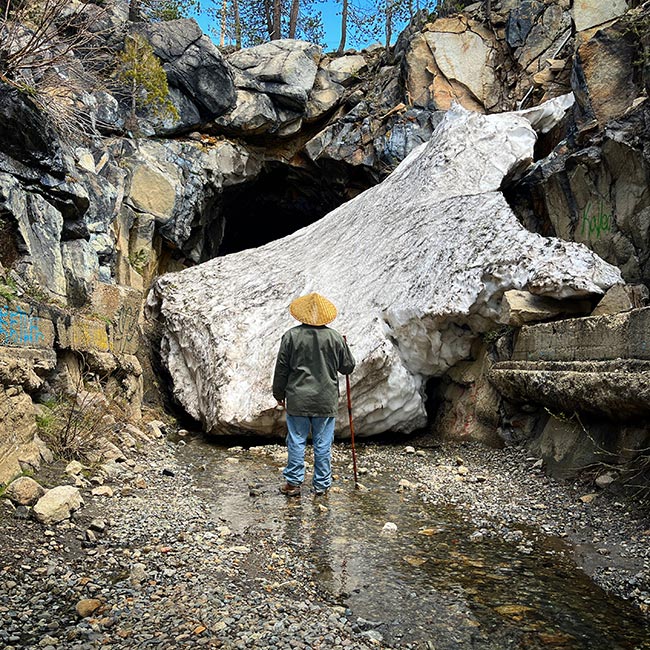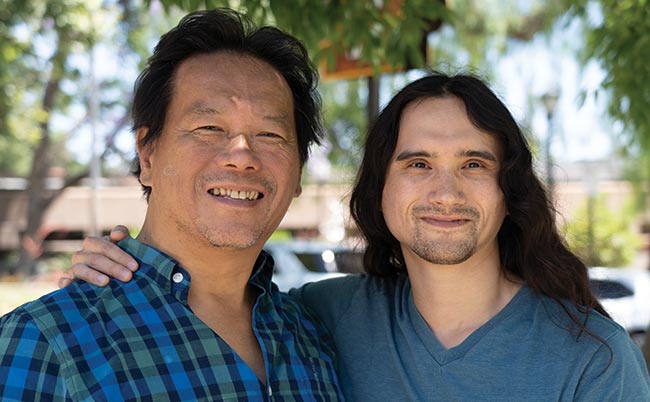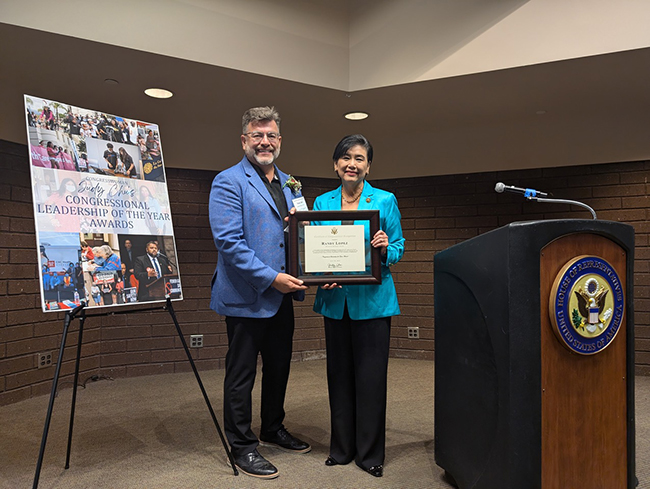‘Iron Horse Road’ explores immigrants’ role in 1860s railroad expansion

Hao Huang stands at the mouth of one of the Donner Pass Summit Tunnels in May. Photo/courtesy of Micah Huang
by Andrew Alonzo | aalonzo@claremont-courier.com
Following last year’s performance of “Asian Dreams/American Nightmares,” Pitzer College alumnus Micah Huang and his father Hao Huang, chair of Scripps College Department of Music, quickly got to work on their next project: an exploration of the development of the Central Pacific Railroad.
In “Iron Horse Road: a Tale from Gold Mountain,” an episodic podcast that will be released Wednesday, July 19, listeners will hear the story behind the construction of the transcontinental connecting railroad, built by some 20,000 Chinese and other East Asian immigrants from 1863 to 1869 and stretching 690 miles from Sacramento through Promontory Summit in Utah. The project resulted in the deaths of more than 3,000 workers, said Hao Huang, the project’s historical consultant.
The podcast focuses on the early life of Yo Hing, a railroad contractor and essential character in Micah Huang’s 2021 podcast, “Blood on Gold Mountain.” It also delves into the Chinese immigrants who constructed railroads through mountainous terrain in Northern California.

Father and son creative duo Hao and Micah Huang. Courier photo/Andrew Alonzo
The father and son team did deep dive research into the transcontinental railroad and the 1860s. They also traveled north to gather field recordings and see the still existing fruits of the immigrants’ labor.
“There’s a lot more there than we thought we were going to find,” Micah Huang said.
The duo traveled between May and June, seeing both dense 15-foot snowpacks and 90 degree weather. The varying conditions and terrain left them in awe of what immigrants labored through.
The two visited a mountain “rail cut” near Auburn that workers leveled by hand; Cape Horn, a massive cliff in the Sierra Nevada near Colfax that laborers carved through; and a tunnel near Donner Summit above Truckee where immigrants blasted through 1,659 feet of solid granite to establish a rail line.
The Donner Summit tunnel is especially important since an eight-day labor strike occurred there in 1867.
“It was ultimately not successful exactly because the railroad company [Central Pacific Railroad] was involved in supplying food to the laborers, and so they just cut off their food supply,” Micah Huang said.
The journey resonated with both men, with Hao Huang recalling Micah Huang felt, for the first time, like he actually belonged in America.
“Those Chinese workers paid in blood and sweat to make this country. We belong here,” Hao Huang added.
Micah Huang hopes the podcast will help Asian Americans reevaluate their inner sense of “invalidity.”
“Like I don’t matter. My voice doesn’t matter. My story doesn’t matter. My experience doesn’t matter,” Micah Huang said. “That’s something that we’ve been very much taught by the narratives about not belonging, about not contributing.”
“We’re often brought up to feel like we’re guests — and not even really welcomed guests,” Hao Huang added.
By shining a light on the significant contributions of Chinese and other East Asians in building America, falsely perpetuated stereotypes can be broken, Micah Huang said.
“The question of free labor versus enslaved labor versus enforced labor is always a little bit of an interesting question in the history of American capitalism,” he said. “And these Chinese laborers really embodied the situation where they have one foot on each side of the line.
“Technically they’re contracted but their contracts are being bought and sold the way that enslaved bodies are bought and sold. They are not permitted to leave the railroad line — they’ll be shot if they attempt to escape — they’re whipped to ensure their productivity is satisfactory, and the money that is allocated to their wages in the budgets of the railroad company is not paid to the laborers, it’s paid to the contractors who own the contracts of groups of laborers.”
The podcast is available for free at blood-on-gold-mountain.captivate.fm. The project was sponsored in part by the Claremont Colleges’ Miriam and Charles Holmes Performing Arts Fund.
Micah Huang wrote and produced the podcast alongside his father. It is a prelude to another in development podcast, “Hungry Ghost Trail,” the father and son team will release next year.
More info is at blood-on-gold-mountain.captivate.fm.









0 Comments